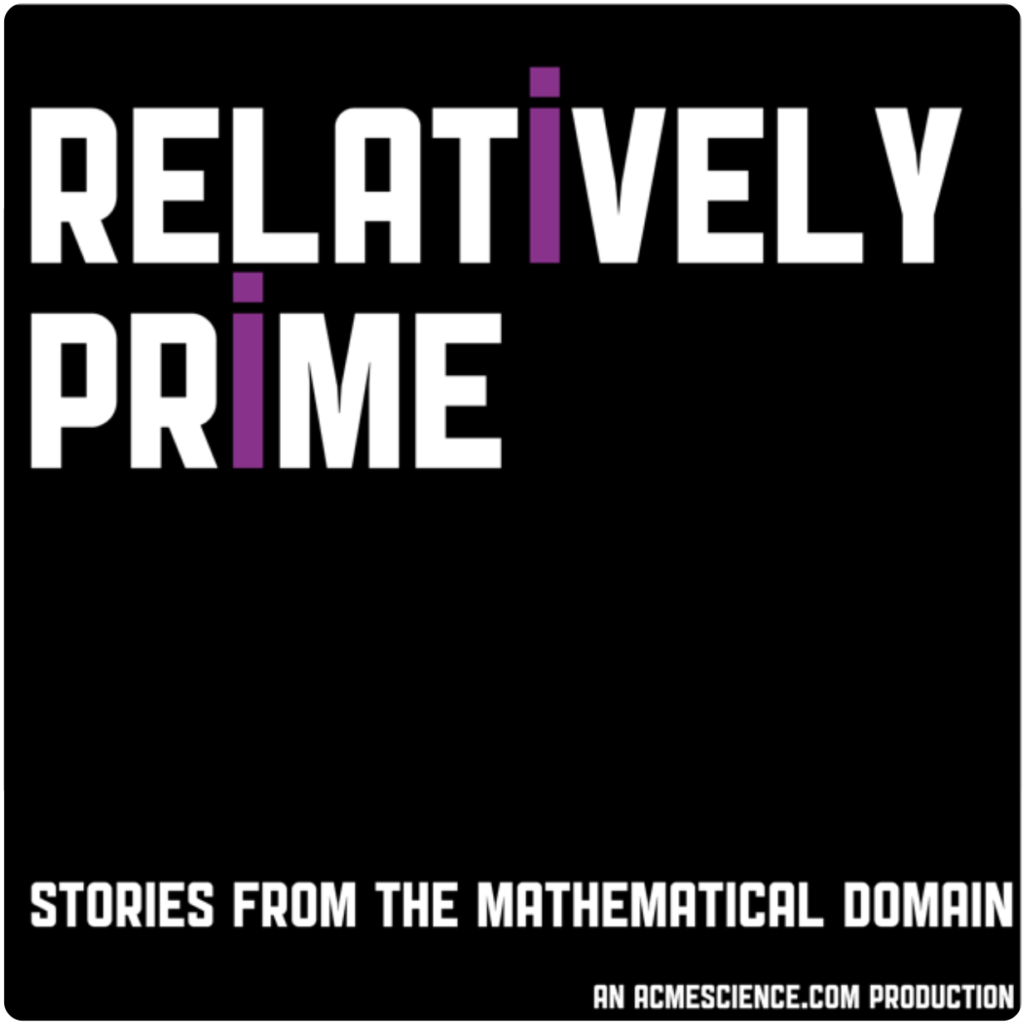In this series of posts, we’ll be featuring mathematical podcasts from all over the internet, by speaking to the creators of the podcast and asking them about what they do.
We spoke to friend of the site and prolific podcaster Sam Hansen about their podcast Relatively Prime.

What is your podcast about, and why did it start?
Relatively Prime features stories from and about the world of mathematics. It began back in 2012 in a giant fit of ego when I thought I could do This American Life, On the Media, 99% Invisble but for mathematics. I would never argue I hit those heights but I do think Relatively Prime is unique among mathematics podcasts in its emphasis on story and reporting.
Who publishes your podcast?
While the logo does say Relatively Prime is an ACMEScience.com production, that just means that I publish it, as ACMEScience is the name I choose back in 2009 to produce my various podcasts, Combinations & Permutations, Strongly Connected Components, and Science Sparring Society, under.
That is not to say I do not receive support for Relatively Prime – in fac,t I would not be able to make the show at all if it were not for my amazing patrons on Patreon.
As for who I am, my name is Samuel Hansen and I am the mathematics librarian for the University of Michigan and a podcast producer. I have been making podcasts since my graduate school days back in 2009, with a distinct focus on mathematics content.
These have included the ones mentioned above, along with Math/Maths which I co-hosted with The Aperidocal’s own Peter Rowlett. Podcasting has brought me around the world, and has led to more opportunities and helped me make more friends than anything else in my life.
Who is the intended audience for the podcast?
Relatively Prime has always been made for the generally intellectually curious. The stories all have something to do with mathematics but you do not need to know anything more than that mathematics exists to follow them. They are as much about the people who do the mathematics or the world in which the mathematics happens and therefore it is my hope there will always be something for anyone to connect with.
What is a typical episode like?
I endeavor to release one episode a month and they tend to be between 20-40 minutes these days, but they can sometimes be shorter – such as Three Scenes from the Life of Benjamin Banneker which ran 10 minutes, or longer, such as my conversation with Robert Schneider which ran an hour.
I do think it is fair to say there is not really a typical episode of Relatively Prime. The show has featured everything from experimental non-narrated pieces to reported features to comedy sketches to straightforward interviews to an audio tour.
I have always done my best to let the story drive how it will be told, which is why the format varies so much. Plus, there are so many different ways to podcast, why stick with just one?
Why is it different to other mathematical podcasts?
There are a lot of podcasts in the world and some will work better for you than others – think of all the mathematics options this series has highlighted! I do truly believe Relatively Prime to be a unique proposition in the world of podcasts though.
It is more than an interview show and tries to go beyond just having a conversation about, an admittedly awesome, mathematical topic to tell a deeper and more fully formed story about the what, the why, the how, and the who of mathematics, from the people and stories we thought we knew well to the stories and people mathematics often sweeps under the carpet. So, if you want to hear a story, Relatively Prime is the mathematics podcast for you.
What are some highlights of the podcast so far?
The 84 hour long bus trip from Baltimore, Maryland, United States to Edmonton, Alberta, Canada that led to the production of Chinook was especially memorable (and one day will likely become a story all its own, but probably for a different podcast), as was getting a shout out about the episode by my favourite BoingBoing editor Cory Doctorow.
That Relatively Prime provided me with the chance to have lunch with Tim Gowers will always stand out, even if I mic-ed it so poorly I was barely able to use the audio.
Making a podcast about a dating experiment featuring one of my favourite podcasters receiving economically based advice from another favourite podcaster on one of my favourite podcasts was wonderfully meta.
Both of the live shows I have recorded at JMMs in 2017 and 2020 were amazing. But I have to say the biggest highlights were definitely getting the Season 1 and Season 2 Kickstarters across the line, so that this crazy show about mathematical stories could even exist in the first place.
I can also recommend Mathematistan, Lottery Daze, the live Origins episode (first ever live musical performace) and my interview with the people behind Mathematically Gifted and Black.
What exciting plans do you have for the future?
Back in March I had the chance to attend the world premier of a play about Margaret Hamilton, who was the director of the group who developed the Apollo flight software for NASA, and will hopefully be producing a story about it. It is called Coding to the Moon, and they hope to tour it around soon, so keep your eye out.
I also have a couple of interviews about mathematics history I made at JMM 2020 which I will be working on producing into stories soon that I am really excited about releasing.